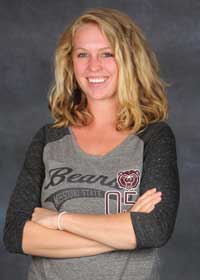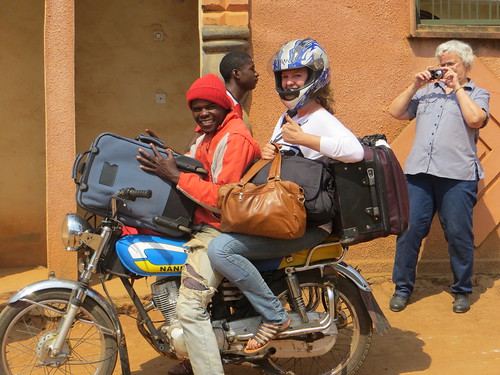How did you decide to enter the Peace Corps?

I heard about it when I was young, maybe 10 or 11. I come from a family that appreciates travel and discovery. My mom spent pretty much all of her 20s in Europe teaching for the Department of Defense. She graduated from Missouri State, taught for two years in small towns, then shipped out to Germany and spent seven years there.
What do you do in Cameroon?
I spend a lot of time hanging out with people! Peace Corps work has three goals: one, the work you are hired to do; two, helping the people in the country understand American culture; and three, bringing your knowledge about their culture back to the United States. Breaking stereotypes is probably the number-one most important role of the Peace Corps.
What type of work do you do?
I work in very remote areas with children whose families might not have a tradition of going to school. My first year, I did a lot of educational talks with youths about ages 12 to 14. We talked about things such as sexual and reproductive health, good communication, self-esteem and responsibility. I realized in Cameroon, the kids go in, sit, listen, copy down what’s on the board — they don’t do many discussions, critical-thinking exercises or classroom activities. A lot of my job in this second year is working with teachers and other adults in the community who are interested in learning about group work and activities that engage youth.
What is your lifestyle in the village?
I live in a concrete house. It’s probably not what any American would ever consider a nice house, but I’ve got a tin roof, I’ve got walls, a concrete floor and I cook on a gas stove. There are mosquito nets to prevent malaria. We do have electricity in my village, but it’s only turned on about 30 percent of the time. If you walk two minutes out my door, you are in the forest.
The Peace Corps covers all of my living expenses, and I get a stipend close to the payment of a third- or fourth-year teacher in Cameroon — the idea is, we are living life with the people the way they are living it.
Probably one of the most important things I’ve learned in Peace Corps is: You can do a lot more than you think you can. It’s just a matter of habit. You think, “I can’t live without electricity or running water or heating or cooling.” I’m doing it! It’s fine.
What is the most moving thing you’ve experienced?
I’d say the plight of children, such as AIDS orphans. There are just too many kids and not enough people who can take care of them.
Do you see that improving?
I do. Young people in their teens, 20s and early 30s have a different mentality and that offers hope. They have better access to the Internet, and it’s becoming more abundantly clear to young Cameroonians that they don’t have to accept corruption or things the way they’ve always been.
What’s the best thing about your job?
I would say a lot of it has to do with people’s smiles. You walk down the road and easily say “bonjour” 20 times. You know the beginning of the movie “Beauty and the Beast,” where they’re saying, “Bonjour! Bonjour!”? That’s exactly what it’s like. Africans are very joyous people and that’s just contagious. So, on a day-to-day basis, I just love the people I’m around.
About Laura Kay Pearson
Hometown
Springfield
Bachelor’s degree
Religious studies and French, ’11
Job title
Full-time volunteer for the Peace Corps since 2011; serves as the Corps’ youth development coordinator in Diang, an eastern region of Cameroon
Foreign language she speaks
French: “I am very fluent if we’re talking about African-village French! … I definitely have an accent, and if you put me in Paris, I will not sound at all fluent among their high-level academia.”
Plans for the future
“I’m sure that graduate school is somewhere along the line. I’m considering doing a third year of Peace Corps, but I would be moving into the city and I would be doing a lot more in partnership with a larger nongovernmental organization. I’m exploring the possibilities of doing long-term NGO work. My ideal would be to be based in the U.S., preferably not too terribly far from home, and then have an opportunity to go abroad intermittently.”



Leave a Reply